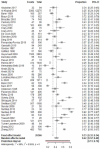Prevalence of dysphagia and risk of pneumonia and mortality in acute stroke patients: a meta-analysis
- PMID: 35562660
- PMCID: PMC9103417
- DOI: 10.1186/s12877-022-02960-5
Prevalence of dysphagia and risk of pneumonia and mortality in acute stroke patients: a meta-analysis
Abstract
Background: Post-stroke dysphagia (PSD) has been associated with high risk of aspiration pneumonia and mortality. However, limited evidence on pooled prevalence of post-stroke dysphagia and influence of individual, disease and methodological factors reveals knowledge gap. Therefore, to extend previous evidence from systematic reviews, we performed the first meta-analysis to examine the pooled prevalence, risk of pneumonia and mortality and influence of prognostic factors for PSD in acute stroke.
Methods: Our search was conducted in CINAHL, Cochrane Library, EMBASE, Ovid-Medline, PubMed, and Web of Science an initial search in October 2020 and a follow-up search in May 2021. Data synthesis was conducted using the Freeman-Tukey double-arcsine transformation model for the pooled prevalence rate and the DerSimonian-Lard random-effects model for prognostic factors and outcomes of PSD.
Results: The pooled prevalence of PSD was 42% in 42 studies with 26,366 participants. PSD was associated with higher pooled odds ratio (OR) for risk of pneumonia 4.08 (95% CI, 2.13-7.79) and mortality 4.07 (95% CI, 2.17-7.63). Haemorrhagic stroke 1.52 (95% CI, 1.13-2.07), previous stroke 1.40 (95% CI, 1.18-1.67), severe stroke 1.38 (95% CI, 1.17-1.61), females 1.25 (95% CI, 1.09-1.43), and diabetes mellitus 1.24 (95% CI, 1.02-1.51) were associated with higher risk of PSD. Males 0.82 (95% CI, 0.70-0.95) and ischaemic stroke 0.54 (95% CI, 0.46-0.65) were associated with lower risk of PSD. Haemorrhagic stroke, use of instrumental assessment method, and high quality studies demonstrated to have higher prevalence of PSD in the moderator analysis.
Conclusions: Assessment of PSD in acute stroke with standardized valid and reliable instruments should take into account stroke type, previous stroke, severe stroke, diabetes mellitus and gender to aid in prevention and management of pneumonia and thereby, reduce the mortality rate.
Trial registration: https://osf.io/58bjk/?view_only=26c7c8df8b55418d9a414f6d6df68bdb .
Keywords: Acute Stroke; Dysphagia; Mortality; Pneumonia; Prevalence.
© 2022. The Author(s).
Conflict of interest statement
Authors declare no conflict of interest.
Figures
References
-
- Lindsay MP, Norrving B, Sacco RL, et al. World stroke organization (WSO): global stroke fact sheet 2019. London: SAGE Publications Sage UK; 2019. - PubMed
Publication types
MeSH terms
LinkOut - more resources
Full Text Sources
Medical
Miscellaneous





